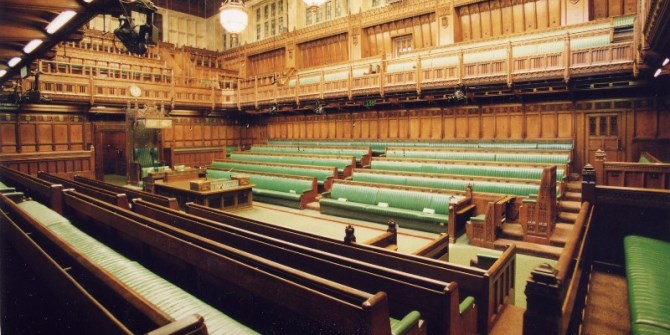 Last night the House of Lords continued its consideration of the coalition bill to prune constituencies to 600 and to hold a referendum on AV, following last week’s unbroken 21 hour sitting. Dale Campbell-Savours explains why Labour Peers are holding out for significant concessions, and how the government could lose its AV referendum date on 5 May if ministers do not make more concessions.
Last night the House of Lords continued its consideration of the coalition bill to prune constituencies to 600 and to hold a referendum on AV, following last week’s unbroken 21 hour sitting. Dale Campbell-Savours explains why Labour Peers are holding out for significant concessions, and how the government could lose its AV referendum date on 5 May if ministers do not make more concessions.
Constitutional changes are made not for the short term, but for many years ahead. Hence they should never be undertaken ‘ill-advisedly, lightly or wantonly’ (in the words of the marriage service) but ‘reverently, discreetly, advisedly, soberly’ and after due consideration of all points of view. Most important of all, the British constitution is not owned by whichever party happens to have a majority in the House of Commons at any given time – it belongs equally to all parties and all citizens.
Hence constitutional changes should always be the most carefully considered and consulted on. Governments with electoral majorities can still change the constitution, of course, but the areas of common ground with opposition parties should always be maximized. And changes should always be evidence-based, grounded in detailed analysis, so that legislators, all political parties and citizens at large should have the clearest possible understanding of what changes will mean when they are implemented.
These values have previously been common ground amongst all the major parties and constitutional bills have always before come to Parliament backed by the fullest information, especially on the operations of election systems. Not all changes have been preceded by investigative commissions, but those that have not have been scrupulously drawn up on the basis of impartial and expert advice. For instance, in 1998 when the Labour government produced legislation setting up the new London Mayor and Greater London Assembly, the legislation came to Parliament accompanied by a detailed and full report on electoral system options from the LSE Public Policy Group, a report that legislators subsequently referred to many times in debates.
Yet the coalition government has now driven a coach and horses through all previous conventions by bringing forward a vitally important bill on the electoral foundations of our democracy, the Parliamentary Voting System and Constituencies Bill, without any consultation at all, and without any effort being made to commission expert reports or to assess in advance what the implementation of changes will mean.
Instead, in order to sustain intact the fragile Conservative and Liberal Democrat government, ministers have so far insisted that only exactly what was agreed in the two parties’ initial coalition negotiations back in May 2010 can be legislated. The Tories get their proposal of reducing MPs to just 600 and introducing fanatically equalized constituencies, only so long as it is integrally coupled with Nick Clegg’s referendum on introducing the Alternative Vote. No substantial amendments or deviations from plan have so far been accepted, and no ministerial explanation has been given in response to the many problems with the government’s scheme – documented very well on by commentators on this Blog.
It is for these reasons that Labour Peers were again debating the bill until the early hours of this morning and will do so again tonight. We are trying at the last minute to get the government to offer some reasoned amendments – especially on key issues, such as allowing a more reasonable variation of the constituency sizes to respect local community identities, and making sure that the constituencies are not going to be constantly redrawn every five years, as the current legislation proposes.
In his opening statement yesterday, Lord Strathclyde, the Conservative leader in the Lords, hinted at some flexibility, but he has also threatened to guillotine discussion in the Lords, something that the House has never before accepted, and I hope never will. Unless these hints are developed into sensible proposal for compromise, and the government accepts the need to maximize agreement around constitutional changes, the government now runs a real risk of losing its own AV referendum.
Click here to respond to this article.
Please read our comments policy before posting.







No constitutional change should be rushed through, whatever the short term political pressures – the Lords must be able to give the proposed legislation proper consideration. There is no clear link between reducing the number of constituencies and introducing AV except political reasons internal to the coalition. There is no benefit to our democracy if they are combined in the same bill.
The problem is that all concerned perceive an advantage or disadvantage for their party in each of these matters, and this is what is driving events. Our politicians need to show more altruism in this matter. It would do their reputations no harm.
The coalition should abandon its plans and, after proper consideration and consultation, introduce an electoral system that does not favour one party or the other, where constituency boundaries, or even the number of MPs, make no difference to the election outcome. This can best be achieved with a simple form of PR incorporating the single member constituency where every vote makes a difference to the election outcome.